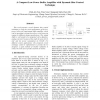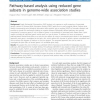204 search results - page 14 / 41 » New 802.11h mechanisms can reduce power consumption |
ISQED
2006
IEEE
14 years 1 months ago
2006
IEEE
As transistor counts keep increasing and clock frequencies rise, high power consumption is becoming one of the most important obstacles, preventing further scaling and performance...
ASPDAC
2010
ACM
13 years 5 months ago
2010
ACM
In this paper, we present a new voltage IR drop analysis approach for large on-chip power delivery networks. The new approach is based on recently proposed sampling based reductio...
VLSID
2004
IEEE
14 years 8 months ago
2004
IEEE
This work presents a novel dynamic bias control technique to verify the circuit performance of the lowpower rail-to-rail input/output buffer amplifier, which can be operating in s...
BMCBI
2011
13 years 2 months ago
2011
Background: Single Nucleotide Polymorphism (SNP) analysis only captures a small proportion of associated genetic variants in Genome-Wide Association Studies (GWAS) partly due to s...
HPCA
2002
IEEE
14 years 8 months ago
2002
IEEE
This paper explores the role of branch predictor organization in power/energy/performance tradeoffs for processor design. We find that as a general rule, to reduce overall energy ...


